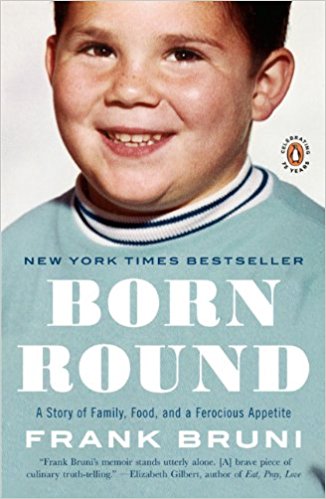 Just finished a fascinating book mostly about food and our relationship to it. Frank Bruni, who was the restaurant critic for the New York Times from 2004-2009, spent most of his life battling his weight. He grew up in an Italian-American family that put great emphasis on having mounds of food available at any and all times. If there wasn’t enough food on the table to make it sag, then there wasn’t enough. As Bruni moved into young adulthood he tried amphetamines, forced vomiting, and other extremely unhealthy measures to control his weight. After college he became a journalist, and at one point he was following George W. Bush on his campaign trail. He calculated that there were eight meals served daily to the press corps in an effort to keep them (literally) fat and happy so that they’d report positively on the candidate.
Just finished a fascinating book mostly about food and our relationship to it. Frank Bruni, who was the restaurant critic for the New York Times from 2004-2009, spent most of his life battling his weight. He grew up in an Italian-American family that put great emphasis on having mounds of food available at any and all times. If there wasn’t enough food on the table to make it sag, then there wasn’t enough. As Bruni moved into young adulthood he tried amphetamines, forced vomiting, and other extremely unhealthy measures to control his weight. After college he became a journalist, and at one point he was following George W. Bush on his campaign trail. He calculated that there were eight meals served daily to the press corps in an effort to keep them (literally) fat and happy so that they’d report positively on the candidate.
But then something interesting happened. He moved to Rome to become the bureau chief there and pondered the question that so many others had before him: why weren’t the Italians fat? He examined several theories but ultimately came to the following astounding conclusion: “In the end, Italians were generally slimmer than Americans for the plainest, most obvious reason of all. They ate less.” Born Round: A Story of Family, Food and a Ferocious Appetite.
How can this possibly be true? How can people who live in a country that worships food be thin because they eat less? The answer is that they are food snobs (in an entirely good way). They want small portions of the very best. They want to take their time and savor every mouthful. They have rituals and significance built into the way they eat, and those rituals don’t include pigging out.
The same is true of other European countries. We used to know a girl from France and quizzed her on French eating habits. She seemed very puzzled by the American approach to food. We seemed to eat a lot, and we ate it very fast. The French had long, leisurely meals, with pauses between courses. Portions were small. As great humorist Art Buchwald said about his time living in Paris: “Dinner is not what you do in the evening before something else. Dinner is the evening.”
So, to refer back to my recent post on whether or not discipline always involves deprivation: maybe in the area of food it’s better to think in terms of true enjoyment. Maybe the best way to eat well is to . . . eat well. To stop while you’re still enjoying your meal, knowing that another one will be coming up in a few hours. To refuse to mindlessly crunch away at some horrible sn-a-a-ck. To be a true connoisseur, a true gourmet. To take real pleasure in your food.
More to come on this fascinating topic, including a thought experiment and my Five Golden Rules of Eating. Maybe even my adventures in using the accountability website stickK to meet a goal of losing 7.5 pounds in four weeks. (I’m not doing very well so far, but now that I’ve re-exposed myself to the ideas in this post I know why.) As in so many areas, the first step is to pay attention.